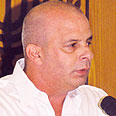
Waiting for the next Jewish terrorist
The intelligence community is in denial about a very real threat
Only when reading the fine print, and even then not in all media outlets, were readers informed about Diskin's appraisal of another incident falling under his authority: the culmination of the Abarbanel Commission, established to investigate possible failures by the security and IDF establishments with regard to the case of IDF deserter Eden Natan-Zada, who calmly boarded a bus in Shfaram in July and killed four Arab Israeli citizens.
Diskin admitted there had been a failure in transmitting intelligence information between different bodies, but repeated the Shin Bet's official position that IDF accusations were highly exaggerated.
Jewish terror: continued threat
But this internal, security establishment argument is far less interesting than another reality made public by the Abarbanel Commission: in recent months, as the threat of Jewish terror has grown - and not only against the life of the prime minister, but mainly against innocent civilians in Israel and the West Bank – the security establishment has not changed its priorities at all. Including the Shin Bet.
Just like the media is far more concerned with the war against the Palestinians, so, too, do security organizations continue to emphasize the fight against external enemies.
Jewish terror? "The entire establishment is in denial," said one senior intelligence official, well versed in the Abarbanel Commission findings.
In theory, the threat of Jewish terror should have shrunk following the disengagement from Gaza. Natan-Zada, and fellow terrorist Asher Weissgad, wanted first and foremost to ignite wide-scale Arab riots that would derail the pullout.
But even now, there are hundreds of deeply bitter people waling around, looking for some way to get out their anger.
Nor are we talking merely about revenge: Prime Minister Sharon made it clear, in the speech he never delivered to the Likud Central Committee this week, that the Gaza pullout would not be the last.
With this in mind, Sharon's victory Monday will only increase the motivation and frustration for some of these potential murderers.
And the next Jewish terror attack, said one member of the IDF General Staff, could ignite a third Palestinian intifada, this time inside Israel.
Two reasons for denial
So why is the establishment in denial? For the same two reasons the media refuses to put this part of Diskin's analysis in the headlines: first of all, because external threats from Israel's neighbors have always been a good smokescreen to deflect attention from Israel's difficult domestic issues.
Secondly, because it has always been the nature of Israel's intelligence organizations to lean heavily towards initiating operations, towards acting first.
Prevention, security, defense are foreign concepts in this context to the IDF, Shin Bet, and other security/intelligence groups.
In recent years, the "initiative" Shin Bet has been the subject of wide praise. At the same the Abarbanel Commission revealed coordination and priority problems on the defensive side, the organization figured out how to find Islamic Jihad leader Sheikh Khalil in the right place at the right time to knock him out with a missile.
In this context, the Israeli establishment is the best in the world.
No reward for the hunt
But finding the next Natan-Zada is a dark task, because there is no reward waiting at the end of the hunt: Jewish terrorists apprehended before the disengagement provided little intelligence.
Without placing all the blame on the Shin Bet, we must wonder whether or not the security establishment understands the high priority placed by the intelligence community on the matter.
The fight against terror is important. Preventing the next nationalist murder could save at least as many lives and prevent complications no less threatening.










